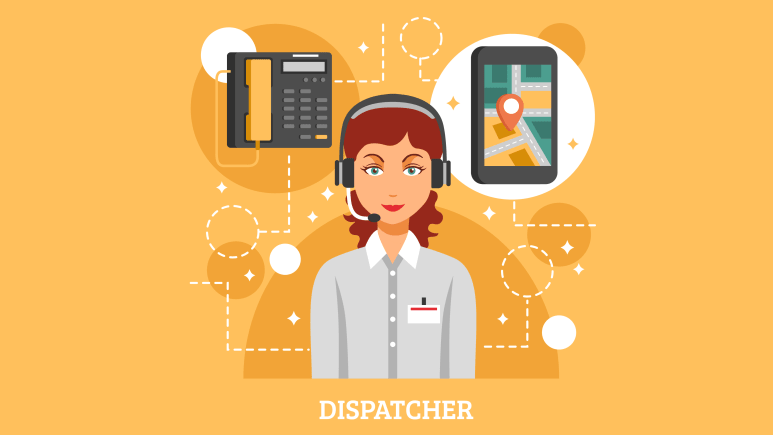A truck dispatcher is integral to the success of a delivery chain and works with both the drivers and customers along a delivery or collection route.
Dispatchers play a key role in getting trucks out to collect and deliver loads for businesses shipping goods.
Without them, we can hardly imagine the trucking industry, so let’s dive into this profession and what does it needs to become a successful dispatcher.
Main responsibilities of truck dispatchers
1. Receive and Dispatch Orders
Answering phone calls from drivers, shippers and brokers.
It’s critical that the dispatching staff is highly trained and always available.
2. Coordinate and manage the most efficient load
Load planning is crucial to the success of the company.
Truck dispatchers need to make the best decisions for all.
Technology should assist in planning and building the best possible loads.
3. Arrange Delivery and Pick up Times and Special Handling Requests
Schedule delivery and pick up times while taking into consideration the customer’s time frame requirements.
Determine the best delivery methods and negotiate rates directly with vendors and customers.
Also dispatch drivers while balance the driver’s needs (home time or financial) and the needs of the company.
Ensure to give information to the truck driver if there are any special features in the freight they may have.
4. Keep truckers up to date on road conditions
Freight dispatchers help the drivers to navigate weather delays by taking charge of driver scheduling.
They notify when unexpected driving conditions occur.
Usually weather forecast and telematic solutions are used to plan ahead.
5. Reviewing driver’s logs
Keep records, monitoring drivers’ daily logs and monitor equipment availability.
Also comply with state and federal transportation regulations, procedures, and laws.
6. Monitoring truck repairs and maintenance schedules
Provide assistance, support and crisis management for drivers.
Make sure all the trucks are perfectly equipped to ensure the safety on the road.

Skills that truck dispatcher needs to posses
1. Organization and communication
Dispatchers are handling a lot of calls and taking a lot of information so they need to be very organized and efficient.
They need to have excellent communication and negotiation skills.
2. Patience
The dispatchers have to be able to stay calm in every situation that finds them.
They also need to be patient as they communicate with the driver, gather the information that’s needed and act accordingly.
If a customer gets angry on the phone, they need to know how to provide excellent customer service with a pleasant attitude.
3. Computer skills
The impact of technology is showing in every corner of modern life, so the truck dispatchers need to be “computer skilled” in a way that they can handle data entry and use the dispatch software.
If they know how to work with the computer systems and phone technology, they can make the business run smoothly.
4. Problem-solver
This is very important skill to have because sometimes things don’t go as planned.
Dispatchers need to adapt to every situation and find solution so both sides can be satisfied with the final product.
5. Ability to prioritize tasks and manage time
The dispatchers have to be able to evaluate the situation, ask the right questions and assist in their best to the customer in need.
They need to prioritize tasks so the most pressing concerns get addressed first.
This can help avoiding delays.
Keys to be successful dispatcher

1. Honesty
Truck drivers respect the most the integrity and honesty of their dispatchers.
Just a little lie, can make the drivers lose their trust.
2. Get to know the drivers
It’s important to make an effort to get to know the drivers. Some of them are connecting on a personal level with their dispatchers and they are building strong work relationships. This shows the drivers that dispatchers care about them and value them as a person.
3. Detail-driven
Keeping notes and lists are maintaining clear schedule. That helps the dispatchers to make sure that they work accurately and are limiting their distractions.
4. Confidence
The most successful dispatchers exude with confidence. Confidence doesn’t just happen overnight. It comes with time and experience. In every aspect, dispatching requires you to “sell yourself”. Discussing rates with brokers or shippers is asking to reach higher rates, or when a problem occurs it asks “are you able to fix it”.
5. Know the market
It`s important to know the best routes, shortcuts and also the current pricing. This knowledge can lead you to make the most efficient decisions.
6. Plan
Make plans for the upcoming workday. Having clear and precise list of the loads, gives the dispatcher a step ahead to make effective load schedule.
7. Consistency
Not even one driver should feel that someone is getting preferential treatment. All the loads should be spread evenly throughout all of the drivers.
Further Reading: What Are The Main Problems That Truck Drivers Face?
Trucking is the primary method of transporting goods and considered to be the foundation of the American industry. The team effort between truck driver and truck dispatcher is the key to successful business.



